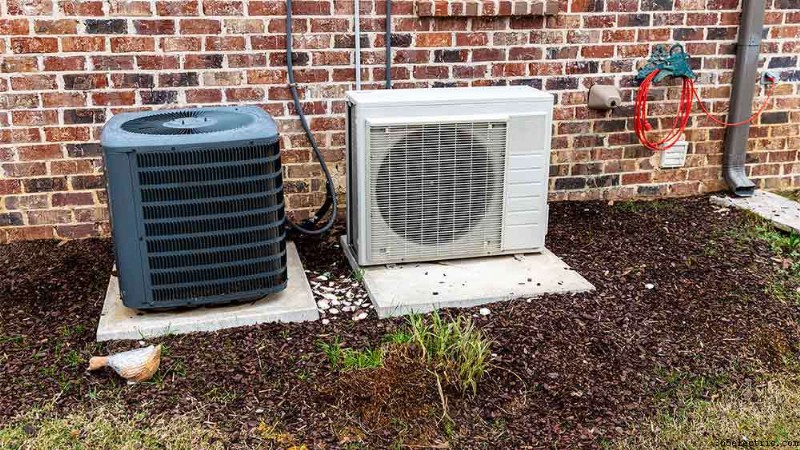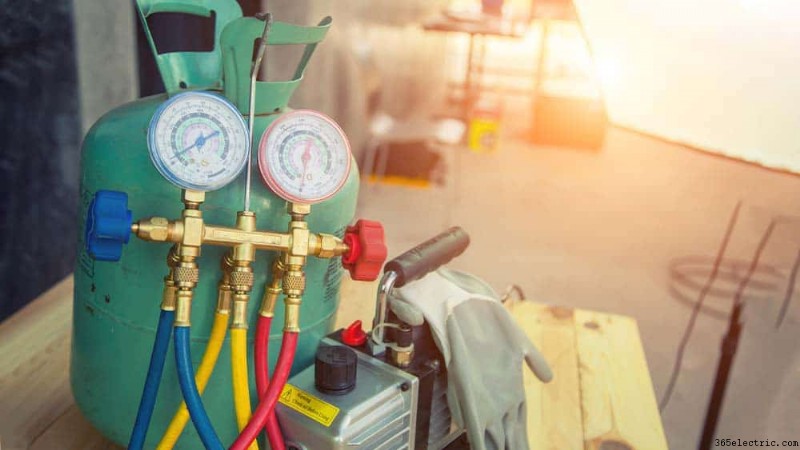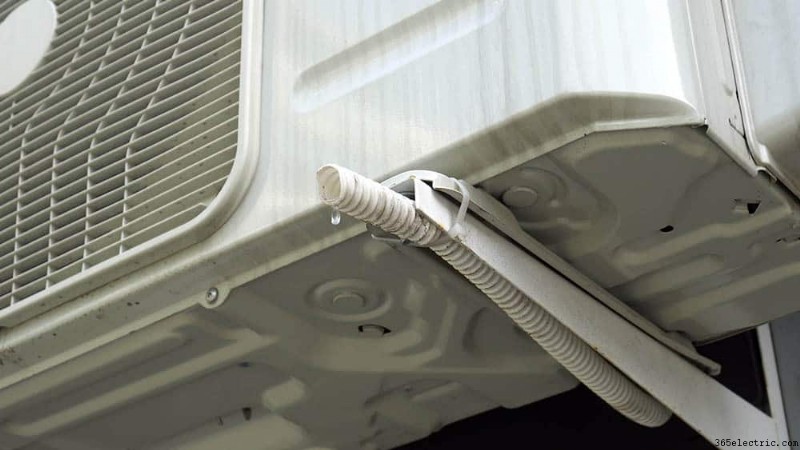Ruidos del aire acondicionado:qué los causa y cómo reparar un aire acondicionado que hace ruido

Las unidades HVAC modernas utilizan tecnología de amortiguación de sonido que mantiene el nivel de sonido entre 25 y 55 decibelios, según el tipo de aire acondicionado. En palabras simples, 25 decibelios equivalen al sonido de un susurro, 55 decibelios equivalen a una conversación normal de nivel medio en el hogar. Los últimos aires acondicionados de ventana y mini-split sin ductos tienden a ser más silenciosos que los sistemas centrales con ductos. Cualquier aire acondicionado que haga ruidos que sean extremadamente fuertes y extraños, lo más probable es que sufra algún mal funcionamiento o un problema que requiera atención especial. Los ruidos del aire acondicionado, aunque bastante molestos, pueden ayudarlo a saber que algo salió mal antes de que llegue al punto en que no se pueda reparar o sea demasiado costoso repararlo, como reparar un motor de ventilador o un compresor.
A veces, diferentes problemas pueden causar el mismo tipo de ruido, por lo que es esencial saber qué pueden significar los distintos ruidos.
Hemos compilado una lista extensa de todos los ruidos de CA que puede encontrar y los problemas que significan para ayudarlo a solucionar problemas la próxima vez que su unidad genere un problema de ruido.
1. Ruido de golpes o traqueteo del aire acondicionado
Si escucha un ruido de CA que suena como un golpeteo agresivo, es probable que sea un problema del condensador, pero no necesariamente. Aquí hay algunas razones con posibles soluciones para arreglar este ruido aterrador:
Partículas de suciedad que se atascan en su condensador
El ruido del aire acondicionado golpeando o traqueteando no necesariamente se debe a un problema importante y puede solucionarse fácilmente. A veces, palos, hojas y otras partículas de suciedad se atascan en el condensador, lo que puede causar este ruido. Si su unidad exterior está rodeada de arbustos, las pequeñas hojas y ramitas pueden atascarse si olvida limpiar el condensador por un tiempo.
Retire la cubierta del condensador para eliminar los elementos atascados. Si le resulta complicado manejar su unidad HVAC, considere llamar a un profesional.
Tornillos sueltos
Además, muchos ruidos de traqueteo también son el resultado de tornillos sueltos. Tanto las unidades internas como externas de un acondicionador de aire vibran cuando se encienden. Con el tiempo, esta vibración puede hacer que los tornillos se aflojen.
This issue is simple to fix, and all you need to do is tighten the screws with a screwdriver.
Broken Fan Motor or Compressor
The worst-case scenario will be if your air conditioner makes a banging noise when starting. It could be due to a broken compressor. Replacing a compressor can be quite costly, unfortunately. If your unit has crossed the decade mark, it is best to let your air conditioner go instead of wasting money on repairs. Here is a great guide on the lifespan of air conditioners.
If your AC is making a loud noise from inside the unit, it could be due to a broken fan motor or an imbalanced motor, causing the bangs. Replacing the motor will also be costly, so contact a specialist to get a better understanding of the situation.
If your HVAC compressor has a lifetime warranty, you can consider going for repairs as you will only have to pay for the labor cost. An HVAC specialist will be best able to determine the exact cause and then decide if you should opt for repair or replacement.
Note:Do not try to inspect the fan motor while it is running; it can cause serious harm.
2. Screeching &Squealing AC Noises

Is your noisy air conditioner erupting a high-pitched screeching or squealing noise? This can be due to a variety of reasons:
Faulty Fan Motor Bearings
Metal-on-metal screeching noise when you turn your AC on means the fan motor bearings have become faulty and need replacement.
Worn Out or Broken Belt
A worn-out fan belt or a broken belt can also cause a squealing noise. This type of noise is most prevalent in ducted/central air conditioners. In older models, a belt connects the motor and the fan, which can wear out over time. Further, due to high humidity levels, the belt can also contract and expand in summers, which can cause unpleasant noise. Contact a qualified HVAC service for replacing or repairing the belt.
High Pressure in Compressor Unit
If you hear a high-pitched squealing noise from your AC, it means that high pressure has developed in your compressor. Turn off the AC immediately as high-pressure build-up can cause an explosion. Contact an HVAC professional as soon as you can.
3. Air Conditioner Making a Pulsating Noise
If your air conditioner is making slow pulsating noises, there might not be anything to worry about. However, if the noise is loud and rhythmic, it signals a problem.
Loose Fan Blade or Coil
It could be coming from a fan blade or coil that has loosened over time and thus being the cause of this AC noise. You simply need to tighten the screws, and your AC will be back to normal in no time.
AC Plastic Base Pulsating
If a plastic base supports your AC, the compressor motion can cause the whole unit to pulsate, along with the base. To prevent this problem, consider replacing the plastic pad with a wooden one and minimize the vibrations. This can be done by firmly clamping the unit down on the pad and supporting it on small rubber blocks.
Refrigerant Lines Getting in Contact With the AC Walls
A refrigerant line touching the wall can also cause a pulsating noise. Slightly move the lines away from the wall and add insulation; this can be done by adding rubber or foam material.
4. AC Making a Hissing Sound

Have you ever felt like a snake has gotten cozy inside your air conditioner because you keep hearing loud hissing noises? Here are the possible causes and what you can do about them:
Leaking Refrigerant
One of the reasons for the hissing sound is a refrigerant leak. Leaking refrigerant can be due to damage to the refrigerant line. Over time with use, the lines can deteriorate, causing leakage. You would have to contact a professional to resolve this issue as there is, unfortunately, no DIY solution for this problem.
Compressor Valve Leak
A compressor valve leak can also cause hissing noise. The valves control the pressurization of the refrigerant. In this case, you should not wait to contact an HVAC specialist as this issue can lead to severe damage.
High Compressor Pressure
If you feel that the hissing noise has transformed into a shrieking noise after some time, it is a compressor issue. High pressure may have built-up in your outdoor AC unit. This issue needs to be investigated right away, so shut down your AC and call a technician.
5. Clicking Sounds from Your HVAC Unit
A clicking sound at the start and end of a cooling cycle is fine. What isn’t normal is a clicking sound that does not go away. Let’s look at the possible causes:
Obstruction in Your AC Fans
If the outdoor unit is making clicking sounds, there is likely an obstruction in its fans which needs to be removed. Simply perform your routine maintenance or lift the outdoor unit’s cover and wipe your fans clean!
Capacitor Losing Its Charge
Another issue can be the capacitor losing its charge over time. If this happens, the capacitor cannot power the compressor, and the clicking noise you hear is the outdoor unit trying to turn on unsuccessfully. You will need to contact a professional for a thorough checkup.
Fault in Electrical Signals
Moreover, faulty electrical signals can cause the switches to turn on and off, producing clicking noises repeatedly. If you see small sparks accompanying the noise, shut down the unit right away and call an HVAC technician. A spark can become dangerous.
Your AC Fan is Loose
Sometimes, the AC fan becomes loose and keeps hitting your outdoor unit’s case – the result is the clicking AC noise. Call the HVAC service, and they will tell you if the fan can be tightened or needs a replacement.
Malfunctioning Thermostat
A malfunctioning thermostat won’t let your unit turn on, and you will hear a loud clicking sound. During the normal working of a thermostat, you hear a soft clicking sound, which is the sound of a relay switch sending power to the AC. However, if the relay is broken or there’s a wiring issue, the relay will continue to send power (you will hear loud noises) but will fail to turn on the unit. You cannot solve this issue yourself; contact a professional for repairs.
6. Whistling Sound Coming from the AC
Is your air conditioner making noise that sounds like a whistle? This noise may not be as bad as the other air conditioner noises, but it definitely is suggesting that something is wrong. Here are the possible reasons:
AC Duct Has a Leak
The leaky duct of your central AC can make noises that sound like someone’s whistling. The solution is to seal the ductwork properly. In addition to the noise, the leaky duct also causes energy loss which can increase your bills.
Obstruction in AC Air Flow
If an obstruction blocks the airflow in your AC, the high pressure on the blower motor due to lack of air will cause high-pitch whistling noises. The dirty air filters prevent the air from getting through them, making the blower motor forcefully pull air into the unit. The air passing through the cracks will make whistling noises. Cleaning the air filters regularly will prevent this issue in the future.
7. Air Conditioner Making a Humming Noise
An AC motor radiating soft humming sounds is nothing out of the ordinary, but it is concerning when it starts getting loud. Your air conditioner may be humming if:
Lubrication Level is Too Low
A motor that needs lubrication will emit a humming sound in the beginning. But if you continue to run it without fixing the issue, it will turn into a loud grinding noise. You can lubricate the motor if you have done it before, but it’s best to let the professionals do their job.
Contactor Failure
The contactor is responsible for controlling the flow of electricity to your air conditioning unit. A contactor is like a bridge, which connects your air conditioner to the power supply. When the air conditioner is turned off, the contactor opens up, disabling the power supply. When you turn it on, the reverse happens, and the power supply is resumed.
Contactor failure in your AC causes humming noises as the AC is getting power but cannot turn on. If you ignore the issue, it may soon turn into a deafening buzzing sound.
Bent Fin Coils
Humming noises may also come from the fin coils if they get bent. You can fix this issue by using a metal comb to straighten the bent coil fins. Regular HVAC maintenance keeps your fin coils in the best shape.
8. Cracking Sound Coming From AC
When the temperature is set too low, and the moisture is not draining correctly, or the fins are dirty, the coils in your HVAC unit’s evaporator can freeze. When ice falls from these coils, it makes a cracking sound that echoes through your system.
To troubleshoot it, disassemble your AC and gain access to the fins. Wash the fins with dish soap thoroughly and let them dry. Only disassemble the AC if you have done it before successfully; otherwise, consider calling a technician.
9. Buzzing Air Conditioner Noise
Is your air conditioner making loud buzzing noises? This can be signifying various problems:
Compressor Malfunctioning
If you hear an AC compressor noise, it has likely malfunctioned. If it is still getting power after it has stopped functioning – a buzzing sound is the result. You will need to replace the compressor, which is pricey.
Loose Parts
If there are loose parts in your HVAC system, they can cause vibrations while running, which can feel like buzzing sounds.
Capacitor Breakdown
A capacitor that has gone bad can prevent the fan from turning on and cause a buzzing sound due to friction. The capacitor stores energy until it is needed, then releases it to power the outside unit of your AC. An AC technician will tell you if it needs to be repaired or replaced upon inspection.
Faulty Motor
A faulty motor can also cause buzzing. Moreover, obstructions near the copper lines connected to your AC or the copper lines rubbing against each other can make a buzzing noise. It is best to keep the lines well insulated and keep metal-on-metal contact to a minimum.
Contactor Failure
Your AC’s contactor is responsible for controlling the flow of electricity to the compressor. If it malfunctions or wears down, it can prevent the power from flowing. When the HVAC unit tries to start up but cannot because of the defective contactor, your air conditioner will make loud buzzing noises.
This sound will start as a hum, as discussed above, but if left untreated, it can switch to a loud buzz.
Loose Wires
If you hear a steady buzzing AC noise, it is likely due to loosening, exposed wires. Turn off the AC right away as there is a high chance for an electric spark and have the wiring fixed.
Freezing of AC’s parts
If your indoor AC unit is buzzing, it can be due to the freezing of its parts. Many reasons can cause the indoor unit to freeze, such as the thermostat set too low, low refrigerant, etc.
To figure out which of these problems you are facing, consult an HVAC technician.
10. Grinding Noise Coming From AC Unit
A grinding noise coming from your AC can be due to a compressor or motor issue.

Compressor Breakdown
Grinding sound from the outside unit signals a compressor issue. The pistons from a defective compressor produce a heavy grinding noise while operating.
Replacing the entire compressor is generally recommended rather than repairing its internal parts.
Motor Failure
If you hear grinding noises from the inside unit, your HVAC’s motor failure might be the reason. You can prevent this noise by oiling the motor at the beginning of the summer and winter seasons.
11. Bubbling &Gurgling AC Noise
Bubbling and gurgling sounds can easily be confused and could mean the same issue. Here is why they may be occurring:
Improper Sealing of Refrigerant Lines
These sounds usually signal a refrigerant problem. When the air gets trapped in the refrigerant lines, a gurgling sound is the result. A refrigerant leak can also produce a bubbling noise in addition to a hissing noise.
The solution is to seal the lines adequately.
Excess Moisture in Your AC
The excess moisture in the AC can lead to bubbling sounds. A blockage in the condensate drain line creates moisture build-up. This line is responsible for removing the moisture collected by AC from your home. As water is unable to exit the line, it makes a bubbling and gurgling noise.
You can face the same issue when the condensate pump gets damaged. Its function is to pump water from the drain pan to the condensate line from where it exits your house. Too much moisture in the pump can lead to bubbling sounds.
You can disassemble your air conditioner to inspect the drainage line. But it is not advised to change the drain line yourself. Call a certified technician for inspection and repairs.
12. Dripping Sound From Your AC

An AC making noise that sounds like something is dripping can be a cause of concern. Do not start panicking at once; it might be due to excess moisture falling into the drip pan. This is entirely normal. But it might become a matter of concern when the dripping sound is caused by excess condensation.
High Level of Condensation
A high amount of condensation can cause the drip pan to overflow. To remove this noise, you will need to empty the drip pan.
AC Coils Freezing
When the ice from the frozen coil melts, you will also hear a dripping noise. The coils might freeze for many reasons, including dirty air filters and malfunctioning thermostats, which need to be inspected by a professional.
Why You Should Not Neglect AC Noises?
When your air conditioner is acting out of the ordinary, such as by making noise or erupting a smell, it is trying to signal a problem that requires your attention. Neglecting unusual sounds coming from your HVAC unit can turn minor issues into something that could be detrimental to your system’s health in the longer run.
Noise issues can also be dangerous; for instance, a refrigerant leak, signified by a bubbling sound, can lead to refrigerant poisoning in humans. Moreover, ignoring the noise issue can also result in costly expenses, which can be avoided. The sooner you can pinpoint the cause of the noise and resolve the problem, the better it is for your unit’s overall performance.
Taking care of your air conditioner through proper maintenance and regular professional inspections can help prevent strange sounds coming out of your air conditioner. But even then, if you face such an issue, it’s best to find the cause as soon as possible. By solving such problem in a timely fashion, you can prevent expensive repairs further down the road.
- ·Cómo corregir un cable coaxial de ruido
- ·Cómo limpiar su aire acondicionado
- ·¿Qué tamaño de acondicionador de aire necesito?
- ·7 problemas comunes del aire acondicionado y cómo solucionarlos
- ·¿Qué es un aire acondicionado inverter?
- ·4 problemas más comunes de enfriamiento del aire acondicionado (y cómo solucionarlos)
- ·Cómo saber si su acondicionador de aire tiene poco refrigerante
- ·¿Con qué frecuencia debo revisar mi acondicionador de aire?
- ¿Qué es un acondicionador de aire inteligente?
- ¿Conductos de aire ruidosos? Aquí se explica cómo hacerlos más silenciosos
- 13 razones por las que su aire acondicionado no enciende y cómo solucionarlas
- ¿Se está congelando el aire acondicionado? Explore las causas del congelamiento de CA y lo que puede hacer
- Contaminantes del aire interior y cómo deshacerse de ellos
- ¿Cómo funciona un acondicionador de aire?
